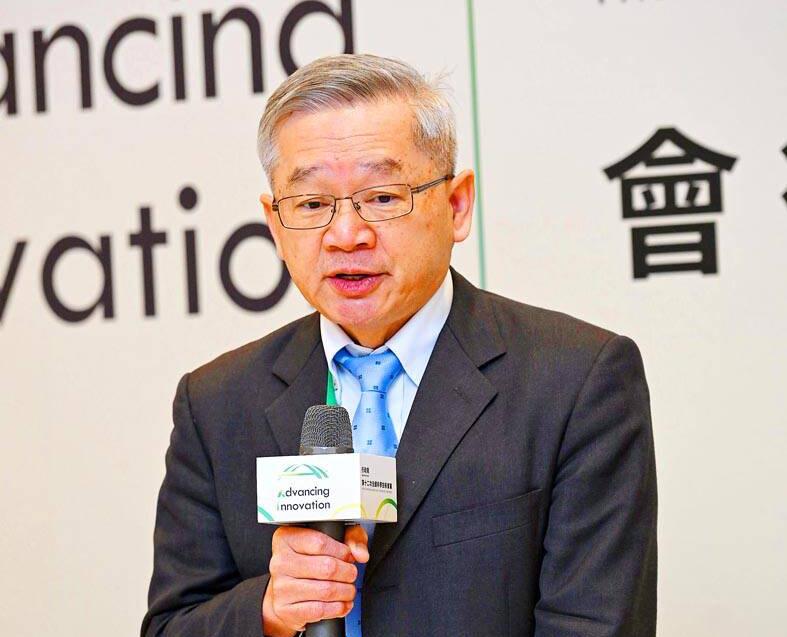Taiwan is launching the “Chip Team Taiwan” initiative to forge robotics, drones and space industry supply chains to decrease dependence on China, National Science and Technology Council Minister Wu Cheng-wen (吳誠文) said yesterday.
Wu made the remarks at a news conference marking the conclusion of the 12th quadrennial National Science and Technology Conference in Taipei.
The integration of semiconductor manufacturing would boost the indigenous tech and defense sector’s growth, he said.

Photo: Chang Chia-ming, Taipei Times
Taiwan has achieved a lot in terms of manufacturing of chips, but lacks the innovation necessary for sustaining industrial capabilities, which are key to resilience, including sovereign artificial intelligence drones and space tech, he said.
Under the Chip Team Taiwan initiative, chipmakers would join forces to accomplish the nation’s smart tech, innovative economy, social balance and net zero carbon emission goals, he said.
The initiative is to focus on improving the capability to develop drones, the space industry, communications satellites and multi-functional robots, he said.
The government’s priority is to supply chips to meet national defense and security needs, especially in drones, while plans for robotics would be disclosed in a few months, he said.
The nation’s semiconductor sector should dedicate more of its production to meet domestic needs instead of catering to foreign clients, he said.
Trade partners should rest assured that Taiwan is committed to secure and resilient supply chains not dependent on parts supplied by China, Wu said, adding that the team’s corporate members would be disclosed later.
Separately, Reuters yesterday reported that Taiwan is engaged in talks with Amazon.com about collaborating on the tech giant’s Kuiper constellation of broadband communications satellites.
The negotiations are part of Taipei’s effort to harden its telecommunications infrastructure in a potential conflict with China, akin to Ukraine’s defensive use of SpaceX’s Starlink network against Russia’s invasion, it said, citing Wu.
A Ministry of Digital Affairs spokesperson said Taiwan is considering a partnership with Amazon, but the talks are still in the early stages.
Amazon is one of the service providers that could potentially meet Taiwan’s national security and performance requirements, they said, adding that redundancies are necessary for a resilient communications infrastructure.
The ministry is carrying out a program to establish a non-geostationary satellite communications network consisting of 773 stations for national defense and emergency response, they said.
Eutelsat OneWeb and SES-operated satellites form the network’s backbone, they said, adding that the ministry aims to achieve 24-hour coverage by the end of the year.
The program’s success is crucial for maintaining the nation’s military and political command during contingencies, they added.
The news of Taiwan holding talks with Amazon came after reports dating back months suggesting a rift between the nation’s officials and SpaceX chief executive officer Elon Musk, a close ally of US president-elect Donald Trump.
In February, the US House of Representatives Committee on China demanded that Musk ensure US troops in Taiwan can use Starshield, the military version of Starlink, after multiple sources told a congressional committee that SpaceX had denied service to the nation.
Last month, Musk allegedly asked Taiwan-based suppliers to move manufacturing abroad, citing “geopolitical concerns,” the Guardian said in a report.
Additional reporting by Reuters

The Central Election Commission has amended election and recall regulations to require elected office candidates to provide proof that they have no Chinese citizenship, a Cabinet report said. The commission on Oct. 29 last year revised the Measures for the Permission of Family-based Residence, Long-term Residence and Settlement of People from the Mainland Area in the Taiwan Area (大陸地區人民在台灣地區依親居留長期居留或定居許可辦法), the Executive Yuan said in a report it submitted to the legislature for review. The revision requires Chinese citizens applying for permanent residency to submit notarial documents showing that they have lost their Chinese household record and have renounced — or have never

A magnitude 5.6 earthquake struck off the coast of Yilan County at 12:37pm today, with clear shaking felt across much of northern Taiwan. There were no immediate reports of damage. The epicenter of the quake was 16.9km east-southeast of Yilan County Hall offshore at a depth of 66.8km, Central Weather Administration (CWA) data showed. The maximum intensity registered at a 4 in Yilan County’s Nanao Township (南澳) on Taiwan’s seven-tier scale. Other parts of Yilan, as well as certain areas of Hualien County, Taipei, New Taipei City, Taoyuan, Hsinchu County, Taichung and Miaoli County, recorded intensities of 3. Residents of Yilan County and Taipei received

Taiwan has secured another breakthrough in fruit exports, with jujubes, dragon fruit and lychees approved for shipment to the EU, the Ministry of Agriculture said yesterday. The Animal and Plant Health Inspection Agency on Thursday received formal notification of the approval from the EU, the ministry said, adding that the decision was expected to expand Taiwanese fruit producers’ access to high-end European markets. Taiwan exported 126 tonnes of lychees last year, valued at US$1.48 million, with Japan accounting for 102 tonnes. Other export destinations included New Zealand, Hong Kong, the US and Australia, ministry data showed. Jujube exports totaled 103 tonnes, valued at

BIG SPENDERS: Foreign investors bought the most Taiwan equities since 2005, signaling confidence that an AI boom would continue to benefit chipmakers Taiwan Semiconductor Manufacturing Co’s (TSMC, 台積電) market capitalization swelled to US$2 trillion for the first time following a 4.25 percent rally in its American depositary receipts (ADR) overnight, putting the world’s biggest contract chipmaker sixth on the list of the world’s biggest companies by market capitalization, just behind Amazon.com Inc. The site CompaniesMarketcap.com ranked TSMC ahead of Saudi Aramco and Meta Platforms Inc. The Taiwanese company’s ADRs on Tuesday surged to US$385.75 on the New York Stock Exchange, as strong demand for artificial intelligence (AI) applications led to chip supply constraints and boost revenue growth to record-breaking levels. Each TSMC ADR represents